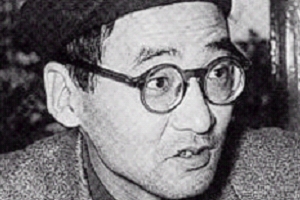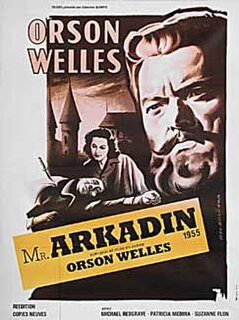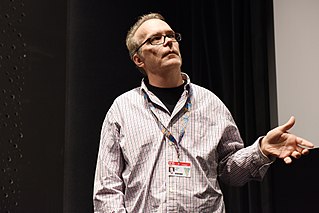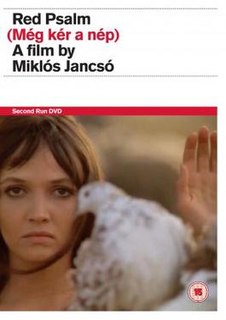The first of the AFI 100 Years... series of cinematic milestones, AFI's 100 Years…100 Movies is a list of the 100 best American movies, as determined by the American Film Institute from a poll of more than 1,500 artists and leaders in the film industry who chose from a list of 400 nominated movies. The 100-best list was unveiled in 1998.

The Saturn Award for Best Supporting Actor on Television is presented annually by the Academy of Science Fiction, Fantasy and Horror Films, honoring the work of actors in science fiction, fantasy, and horror fiction on television.
Terence Davies is an English screenwriter, film director, novelist and actor. He is one of the most acclaimed British filmmakers of the present. He is best known as the writer and director of Distant Voices, Still Lives (1988) and The Long Day Closes (1992) as well the collage film Of Time and the City (2008).
Jonathan Rosenbaum is an American film critic. Rosenbaum was the head film critic for the Chicago Reader from 1987 until 2008, when he retired at the age of 65. He has published and edited numerous books and has contributed to some of the world's most notable film publications, including Cahiers du cinéma and Film Comment.

Yasuzo Masumura was a Japanese film director.

Mr. Arkadin, known in Britain as Confidential Report, is a French-Spanish-Swiss coproduction film, written and directed by Orson Welles and shot in several Spanish locations, including Costa Brava, Segovia, Valladolid, and Madrid. Filming took place throughout Europe in 1954, and scenes shot outside Spain include locations in London, Munich, Paris, the French Riviera, and the Château de Chillon in Switzerland.
A pseudo-documentary is a film or video production that takes the form or style of a documentary film but does not portray real events. Rather, scripted and fictional elements are used to tell the story. The pseudo-documentary, unlike the related mockumentary, is not always intended as satire or humor. It may use documentary camera techniques but with fabricated sets, actors, or situations, and it may use digital effects to alter the filmed scene or even create a wholly synthetic scene.

The Rosenbaum House is a single-family house designed by architect Frank Lloyd Wright and built for Stanley and Mildred Rosenbaum in Florence, Alabama. A noted example of his Usonian house concept, it is the only Wright building in Alabama, and is one of only 26 pre-World War II Usonian houses. Wright scholar John Sergeant called it "the purest example of the Usonian."

François Miron is a French-Canadian experimental filmmaker also working in documentary and fiction.

China Girl is a 1987 film directed by independent filmmaker Abel Ferrara, and written by his longtime partner Nicholas St. John.
Down to Earth is a 1995 Portuguese drama film directed by Pedro Costa. The film is set in Cape Verde Islands, a former Portuguese colony.
Acid Western is a subgenre of the Western film that emerged in the 1960s and 1970s that combines the metaphorical ambitions of critically acclaimed Westerns, such as Shane and The Searchers, with the excesses of the Spaghetti Westerns and the outlook of the counterculture of the 1960s. Acid Westerns subvert many of the conventions of earlier Westerns to "conjure up a crazed version of autodestructive white America at its most solipsistic, hankering after its own lost origins".

Lex Luthor is a fictional character from the television series Smallville. He is featured in the pilot episode until the season seven finale, and has been played continuously by Michael Rosenbaum, with various actors portraying the character as a child throughout the series. The character of Lex Luthor, first created for comic books by Jerry Siegel and Joe Shuster in 1940 as nemesis of Superman, was adapted to television in 2001 by Alfred Gough and Miles Millar—this is only the third time the character has been adapted to a live action television series. The character has also appeared in various literature based on the Smallville television series, none of which directly continues from or into the television episodes.
Senses of Cinema is a quarterly online film magazine founded in 1999 by filmmaker Bill Mousoulis. Based in Melbourne, Australia, Senses of Cinema publishes work by film critics from all over the world, including critical essays, career overviews of the works of key directors, and coverage of many international festivals.

Red Psalm is a 1972 Hungarian film by Miklós Jancsó. The literal translation of the title is "And the People Still Ask", a quote from a poem by Sándor Petőfi.

Golub is a 1988 documentary film, produced by Kartemquin Films, that examines the life and work of controversial painter, Leon Golub. Inspired by war, political oppression and the fight for Free Speech, Golub and his paintings are famous for their depictions of extreme violence. Also featured prominently in the film is his wife, anti-war feminist and artist, Nancy Spero. The documentary tracks Golub from starting with a blank canvas to a touring North American exhibition and eventually to an exhibition in Northern Ireland.
The Miracle of St. Anne was a short film, now lost, made by Orson Welles. It served as a prelude to the play The Unthinking Lobster, which was written and directed by Welles as part of a collection of two one-act plays performed under the banner title of The Blessed and the Damned. The film consisted of the rushes for a Biblical epic that was a film-within-the-play.
Nella terra di Don Chisciotte is an Italian-language documentary travelogue series about Spain, made by Orson Welles. It began filming in 1961, but did not air until 1964. The series follows Welles' travels around Spain, and was narrated by Arnoldo Foà. The series was made for Radiotelevisione Italiana (RAI-TV). Co-starring with Welles were his Italian wife Paola Mori, and their young daughter Beatrice Welles.
Othello was a 1951 production of William Shakespeare's play of the same name, which was produced, directed by and starring Orson Welles in his first appearance on the London stage.

The Citizen Kane trailer was a four-minute, self-contained, "making of" promotional featurette by Orson Welles and the Mercury Theatre, released in 1940 to promote the film Citizen Kane. Unlike other standard theatrical trailers of the era, it did not feature a single second of footage of the actual film itself, but was a wholly original pseudo-documentary piece. It is considered by numerous film scholars such as Simon Callow, Joseph McBride and Jonathan Rosenbaum to be a standalone short film, rather than a conventional "trailer", and to represent an important stage in the development of Welles's directorial style.









